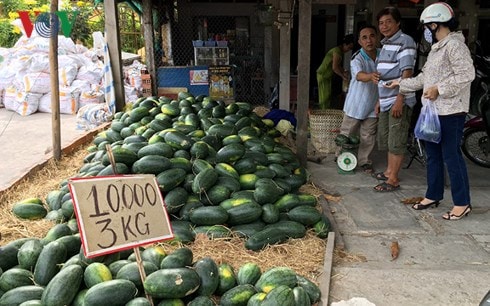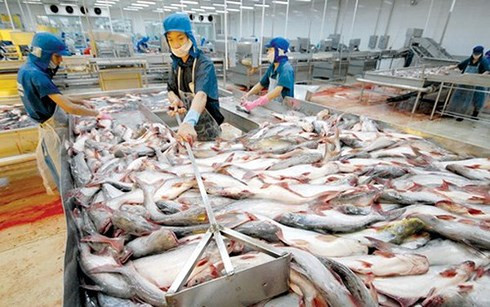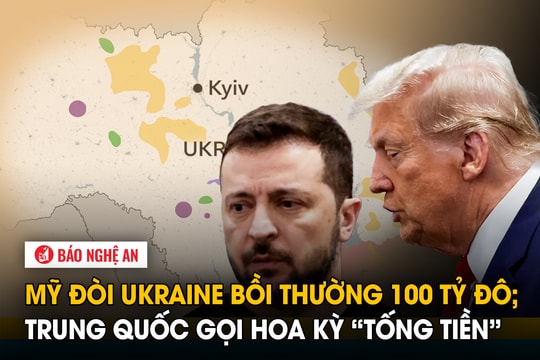US-China trade war puts pressure on Vietnamese agricultural products
Goods from the US and China are flooding in to find new markets due to tariff policies, which puts significant pressure on Vietnamese agricultural products.
In the first 6 months of 2018, the agricultural sector achieved the highest growth rate in the past 10 years, which is a good sign. However, the unstable signals of the export market when affected by the US-China trade war, the European Commission (EC) extending the "yellow card" for Vietnamese seafood, weather developments, and natural disasters are the existing difficulties in the last months of 2018.
Fiercely competitive domestic market
China and the US are two major agricultural export markets of Vietnam. The US-China trade war and changes in import-export policies between these two major economies will affect Vietnamese agricultural products.
Faced with the pressure of the US increasing import tariffs on Chinese exports, Chinese agricultural products will have to find alternative markets. With large supply, low prices, and attractive designs, Chinese fruits and vegetables will continue to put great competitive pressure on Vietnamese agricultural products.
 |
| Domestic and export agricultural markets will be fiercely competitive. |
Meanwhile, US agricultural exports such as fruits and meat products including pork, beef, chicken, duck, etc. will be subject to an additional 25% tax by China in response. These products from the US may also flood into Vietnam more. According to statistics from the General Department of Customs, in May alone, meat imports from the US accounted for the highest proportion among meat import markets into Vietnam, with about 37%, equivalent to nearly 11,000 tons, worth more than 13 million USD. This figure increased by nearly 50% in volume compared to April.
Economist Ngo Tri Long analyzed that the trade war will cause many agricultural products from the US and China to seek new markets and possibly flood into Vietnam, creating competitive pressure for domestic agricultural products. Tariff policies will also be a barrier for Vietnam's agricultural exports to these markets.
“China is a major consumer market for most Vietnamese products such as fruits, rice, seafood, etc. The US-China trade war has caused China’s exports to decrease and China will have to adjust its policies, possibly reducing imports. This will affect Vietnamese agricultural products,” said Mr. Long.
Thus, not only the domestic market but also the export market will face fiercer competition as the US and China will increase their search for new agricultural export markets. Meanwhile, import demand from these two large markets may decrease in the last months of 2018.
Vegetable exports reached 2 billion USD in the first 6 months of 2018, 75% of which was consumed in the Chinese market. Over-reliance on one market will cause negative impacts when fluctuations occur. This is a huge challenge for Vietnamese agricultural products.
Aquaculture still faces many difficulties
In addition to the impacts of the US-China trade war, the European Commission (EC) inspection team pointed out seafood issues that Vietnam needs to continue to overcome, such as: There are still many loopholes in fishing control and traceability of exploited seafood. In addition, there are many shortcomings in certifying exploited seafood, and localities have not been close in directing functional units to implement remedial measures...
 |
| Fisheries are still at risk when the "yellow card" is extended. |
With 33,000 fishing boats, only 3,000 have been equipped with satellite positioning devices. This is a very small number, and the number of boats that need to install satellite positioning devices is very large.
However, Vietnam's fishing industry has always been a traditional one, with old customs and a people's fishing industry. Therefore, implementing regulations on tracing the origin of exploited aquatic products still faces many difficulties.
Deputy Minister of Agriculture and Rural Development Vu Van Tam said that the European Commission (EC)'s extension of time for Vietnam to overcome the "yellow card" is an opportunity for our country's fisheries sector to have more time to complete the EC's recommendations and move towards responsible fishing.
“The Directorate of Fisheries and the Department of International Cooperation directly invited EC experts to participate in cooperation in implementing control, traceability, certification, and confirmation of the origin of exploited seafood. Working in a province, having experts there will help them see the actual difficulties and on the other hand, we have a basis to convince the EC to make appropriate recommendations,” said Deputy Minister Vu Van Tam.
It is expected that in mid-July this year, the Directorate of Fisheries will send the Draft Decree on administrative sanctions in the fisheries sector to the European Commission (EC). The new point in the draft is the addition of penalties for confiscation of vessels and confiscation of licenses for violations. These are Vietnam's efforts to help the fisheries sector escape the EC's yellow card./.


